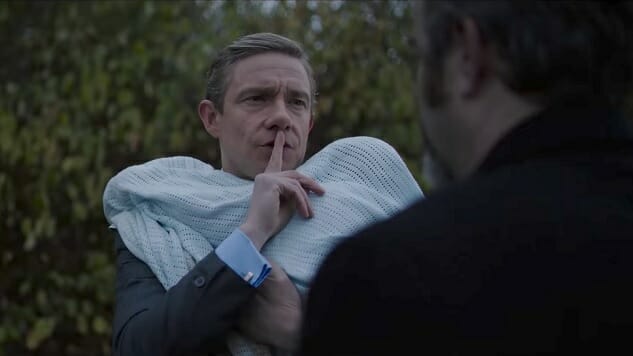No one likes watching good movies put themselves over a barrel in the third act, but watching a good horror movie make that kind of stumble is uniquely frustrating. Take Ghost Stories: After spending an hour in its grip, white knuckling the armrest, perhaps quaking under a blanket, the film hucks a curveball at its audience. After spending an hour scared witless, the last-minute twist feels wholly unbecoming, the sort of plot-deflating tomfoolery we anticipate from M. Night Shyamalan. The air rushes out of the room. Our time has been wasted not on ghoulish frights but smoke and mirrors.
Maybe that’s harsh. Ghost Stories, a joint directorial effort by Andy Nyman and Jeremy Dyson, who adapted the movie from the successful stage play they wrote together back in the late 2000s, isn’t workaday horror hackery. For most of its duration, it’s confidently made, atmospheric and deliciously macabre, a movie that feels like a throwback to yesteryear’s horror without consciously acting like a throwback. Those acquainted with horror history might detect echoes of Nicolas Roeg, Robin Hardy, Michael Powell and the productions of Hammer Films, that beloved British outlet of all things gothic and spooky, but even knowledgeable horror geeks must trace Ghost Stories’ influences on a molecular level. They’re ingrained instead of inserted. It’s the difference between knowing homage and unconscious referencing.
Nyman and Dyson love horror. You can sense that love in Ghost Stories’ embrace of classic multi-narrative structure, wrapping a triptych of horror subcategories around the labors of its lonely hero, Professor Phillip Goodman (Nyman), a man who tasks himself with exposing paranormal charlatans. (Think John Edwards, Theresa Caputo, or Ed and Lorraine Warren.) It’s tough being the guy who charges the stage during televised psychic readings to rain on the audience’s parade, but that’s Goodman’s life. Then he gets a letter from Charles Cameron, a famed paranormal investigator and Goodman’s boyhood idol. Now decrepit and living alone in a van by the ocean, Cameron challenges Goodman to explain three supernatural cases he couldn’t solve himself.
We’re off to the races. Goodman visits the folks who reported each case, giving Ghost Stories an immediacy that most omnibus horror films, even very good ones, otherwise lack: Tony Matthews (Paul Whitehouse), a night watchman working at an old and seriously rundown women’s asylum; Simon Rifkind (Alex Lawther), a shut-in weirdo with an unhealthy fixation on the occult and a chilly relationship with his parents; and Mike Priddle (Martin Freeman), a braggart financier with too much swagger for a guy with such a goofy last name. Tony claims to have seen a ghost child one night while on duty. Simon swears he ran over the Devil himself during an unlicensed late night joyride through the woods. Mike has a whole yarn prepared about a nasty poltergeist haunting his home during his wife’s pregnancy.
We always come back to sad sack Goodman, who throughout his investigations can’t help noticing weird phenomena in between visiting subjects (notably recurring and increasingly abrupt encounters with an ominous parka-clad figure). He’s haunted, too, but mostly by his memories of growing up with his rigid, borderline abusive and presently deceased father. That’s the hook on which Ghost Stories hangs its ghastly musings, the thing we expect the film to circle back to once Goodman completes his inquiries and renders his verdict on the authenticity of each incident. As an abstraction, that sounds like a stairway leading to Frank Capra levels of sentimentality: By wrestling with his skeptical biases, Goodman will confront his buried feelings about his dad and reconcile with his past. Maybe it’s for the best that the movie never goes there.
Where the movie does go is puzzling, introducing new sins for which to punish Goodman. It’s the style of the omnibus film to inflict retribution on the poor bastards passively guiding the story along: The V/H/S films in particular are great at this, as well as the first two Creepshows and Tales From the Hood, among others. Goodman, in other words, has it coming. It’s admirable, too, that Nyman and Dyson don’t take the obvious route, even though the obvious route is the only route sufficiently laid out in the story. But the course they follow grates against Ghost Stories’ set-up and knocks its concluding sequences off-kilter. There’s bizarre incongruity between where we think the film is heading and where it ends up, and where it ends up isn’t scary or even especially moving. It’s frustratingly inert.
Ghost Stories’ failure to see its established ideas through to the end doesn’t totally negate the viewing experience. Each segment remains effectively chilling in a vacuum where the movie’s climax doesn’t exist, Whitehouse’s in particular, and each carries through a thread about familial regrets and anxieties. Tony wears remorse for neglecting his comatose daughter like a badge of shame. Simon lives in mortal fear of his parents and his brother. Mike, well, Mike is Mike, a thoughtless blowhard ill-suited to the rigors of fatherhood. They’re foils for Goodman’s own paternal heartache. Ghost Stories never sees the theme through, opting for a more generic finish that contests our expectations. This isn’t a bait and switch—more just a switch.
Directors: Andy Nyman, Jeremy Dyson
Writer: Andy Nyman, Jeremy Dyson
Starring: Andy Nyman, Martin Freeman, Paul Whitehouse, Alex Lawther
Release Date: April 20, 2018
Boston-based culture writer Andy Crump has been writing about film and television online since 2009, and has been contributing to Paste since 2013. He also writes words for The Playlist,WBUR’s The ARTery, Slant Magazine, The Hollywood Reporter, Polygon, Thrillist, The Week, and Vulture, and is a member of the Online Film Critics Society and the Boston Online Film Critics Association. You can follow him on Twitter and find his collected writing at his personal blog. He is composed of roughly 65% craft beer.
